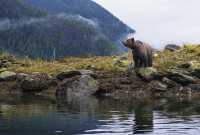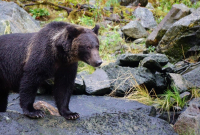Support strong Canadian climate journalism for 2025
Approval of a ski resort in a region held sacred by Indigenous people does not violate their constitutional right to freedom of religion, the Supreme Court of Canada ruled Thursday.
A senior Indigenous leader said the decision demonstrates a lack of knowledge.
"That's sacred ceremonial grounds. That's where our relatives, the grizzly bear, live. And if their habitat is somehow destroyed, you are destroying our relatives," Perry Bellegarde, national chief of the Assembly of First Nations, said in Ottawa.
"To me, it is a bit of a lack of awareness and understanding through the Supreme Court about that world view."
The high court decision means the proposed resort development near Invermere in southeastern British Columbia could be a step closer to reality, although the judgment suggests there might be other avenues for the Ktunaxa Nation to appeal or try to derail it.
The decision stems from a lawsuit filed by the Ktunaxa after developer Jumbo Glacier Resorts received B.C. government approval to proceed.
The Ktunaxa consider the land at the foot of Jumbo Mountain to be sacred and says construction of a resort would drive away Grizzly Bear Spirit, a principal figure in their religion.
They had argued that charter protection for freedom of religion must include not only spiritual beliefs, but also underlying sacred sites — in this case an area known as Qat'muk.
The Supreme Court ruled that religious protections under the charter do not extend that far and only cover freedom to hold such beliefs and the right to manifest them through worship and teaching.
"In short, the charter protects the freedom to worship, but does not protect the spiritual focal point of worship," a majority of the court ruled.
The court said the charter protects the freedom to pursue religious practices, like the wearing of the kirpan, a ceremonial knife, by Sikhs.
"In this case, however, the appellants are not seeking protection for the freedom to believe in Grizzly Bear Spirit or to pursue practices related to it," the court says. "Rather, they seek to protect Grizzly Bear Spirit itself and the subjective spiritual meaning they derive from it."
It says extending the charter as proposed by the Ktunaxa "would put deeply held personal beliefs under judicial scrutiny. Adjudicating how exactly a spirit is to be protected would require the state and its courts to assess the content and merits of religious beliefs."
Bellegarde said the ruling fails to grasp how Indigenous people are connected to the land through spirituality and ceremonies.
"More works needs to be done about educating the judicial branch about inherent rights, Aboriginal rights, treaty rights," he said.
Vancouver lawyer Gregory Tucker, who represents the developer, said his client has waited a long time for the decision.
"The Supreme Court of Canada has been instrumental over many years in bringing forward the process of reconciliation and giving First Nations a real voice in projects to be developed on their traditional territories and in this case, I think, it strikes the right balance," he said.
The high court also concluded that the B.C. minister of forests, lands and natural resource operations "did not act unreasonably" in concluding the constitutional obligation to consult the Ktunaxa about their concerns had been met.
"We arrive at these conclusions cognizant of the importance of protecting Indigenous religious beliefs and practices, and the place of such protection in achieving reconciliation between Indigenous Peoples and non-Indigenous communities."
The mayor of the Jumbo Resort Municipality, Greg Deck, said he watched the negotiations unfold and believes the developer acted in good faith.
"My perception as I watched them do their consultation is that it was genuine, that they weren't just doing it because it was required," Deck said in an interview from Seattle.
He hopes the Ktunaxa will be willing to rejoin design of the resort.
The company has been negotiating for more than two decades with the provincial government and interested parties, including the Ktunaxa and Shuswap peoples, who live in the Jumbo Valley within the Purcell range.
Limited construction began after the B.C. government amended regulations in 2012 to create a municipality — complete with a mayor and two councillors — although the region still has limited infrastructure and no permanent residents.
Work stopped in 2015 when the province ruled Jumbo Glacier had violated the terms of its environmental assessment certificate.
Tucker said Jumbo Glacier has requested a judicial review of the decision. A resolution would be the next step in the plan to build the year-round ski resort.





Comments